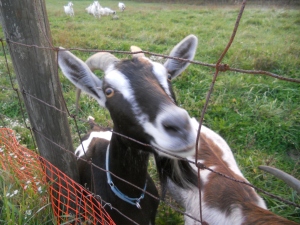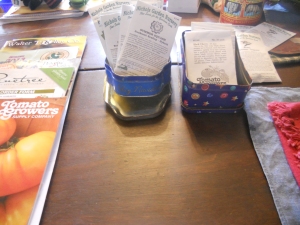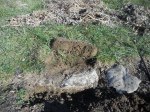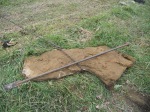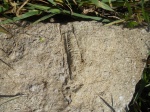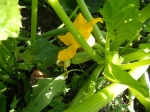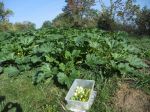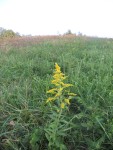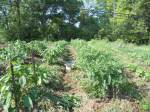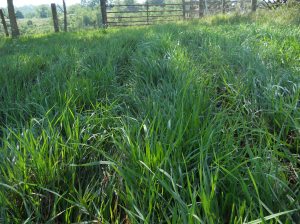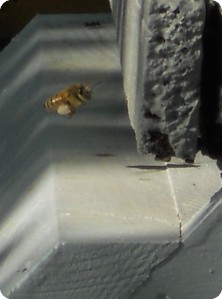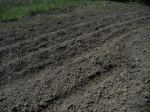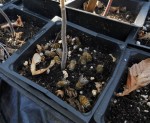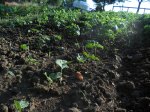You are currently browsing the category archive for the ‘Uncategorized’ category.
Please note my new e-mail addressshadygrovefarmky
If you have attempted to e-mail me at wkybb.net since June 26, please re-send to this address. Thanks very much.
Nancy
My life theme this Fall/Winter has been something like, “Headache of the Day.” In truth, things have been going well: most worries have resolved themselves without much fuss. But every time one fades, another crops up.
Kidding season is approaching, and the does have begun to bag right on schedule… that is, if my notations of when they were likely to have been covered are on target. It’s usually 2 or 3 weeks out, but last year, Aggie #17’s udder began to distend around Dec 1, suggesting a due date I knew to be impossible, to a point where it hurt just to see her lie down. And she didn’t kid until January 26, when it proved to be quadruplets.
Things look much more normal this season, but we’re never free of worry. 7 sets of twins would be fine. Plenty. Perfect.
The weather has been more merciful than in many earlier Winters: no prolonged bitter cold, requiring breaking ice in buckets 3 times a day. The horses have been up, to let them dry off when the temperature was dropping, just for long enough to leave a good accumulation of fertilizer where I can easily shovel and haul it. But rain!! Days of incessant drip, squelch and drumming on roofs, and the consequences for garden work that really should be done in January.

Waited patiently for Winter; only to learn Apricots are best pruned in Summer. So, waiting patiently…

Garlic roots, growing too fast, have thrust cloves out of the soft ground. Too wet to dig them back in, for now.
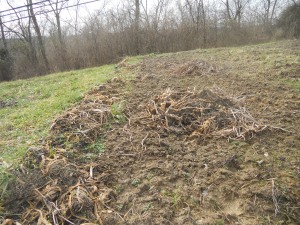
It’s becoming a theme: squash vines pulled right after the hard freeze, haven’t dried out enough to burn, a critical bug control measure.

Heavy, promising buds on the Water Maples will make good bee forage… as long as a warm spell doesn’t tempt them to bloom in January!
Yes, always something. Seed orders are fun and inspiring, after thorough sorting finds lots of viable leftovers. But it would be nice to know for sure that one of the local Farmers Markets can accommodate my full season as in years past… and where that will be. You’ll hear it first!
In childhood, there were always those who came home from play with a pocketful of rocks. (One predictor of becoming a successful geologist must be “tolerant Mom.”) A pity no one in that place, at that time, thought of recommending geology to young women as a career!
Well, I still come home from walks with pockets full of rocks. And rocks often intrude on the garden work (see below).
Lately, encouragement from friends has revived my interest in geology, never really dormant. Our dense clay (with a decade of tillage and compost, it makes good garden dirt) covers, to a depth of 2 to 5 meters, some 3000 feet of sediment from a single period, the Ordovician, when most of Ohio and Kentucky was covered by shallow tropical seas. It makes for fairly monotonous fossil hunting, when rocks everywhere yield the same shattered corals and mollusk shells.
Still, all that calcium gets due credit for weathering into the dense rich soil that supports pasture, garden, goats, horses, bees, vegetables and us.
- That’s Kentucky geology for you: huge slabs work up into the soil of the garden and have to be uncovered and removed.
- And this one isn’t coming out with just a shovel: time for tractor support.
- For scale, the indispensable item called a spud bar is 6 ft long (1.8 m.).
- Entire layers are composed of shells of small brachiopods.
- In the Upper Ordovician, bivalves have become more common.
- A more rare find, Orthoceras, possible ancestor of ammonite, squid or octopus: actually the macro-predator of the ancient sea.
- “Newer” traces: glacial scratches, still ancient, and moss, little changed from its first appearance – millions of years AFTER these mollusks
On yesterday’s hike to gather greenery, a few things got settled about all this. No, I’m not shopping for a display cabinet: the thing for me is to find, identify and relate, not collect. No, I’m not going to travel Kentucky in search of other ages and specimens (though I do keep a rock hammer in the truck for tempting road cuts). But I’ve come to think of the Ordovician with its amazing abundance of shelled creatures, as part of time here, like the fragments of oxidized glass and stoneware. or the flint points – the deep part. I want to know these creatures by name, as I know the weeds, trees and insects, and how they related: for example, were the infrequent cephalopods the top of the food chain, hunting and devouring fragile sea lilies ? Why did this epicratonic sea apparently not support trilobites, the most successful life form in all of world history?
And I can’t resist passing along a handy reply, if you run across anyone who thinks a.) all this could happen in 6,000 years, or b.) that 6-foot slab of calcified shells was left by 40 days of high water. To wit: if the Ordovician, for example, lasted only 456 years, then just by the math, the mud that lay at the bottom of the pond when we moved here in 1988 ought to be rock by now. Anyone want to go check?
Against all probability: “Summer” squash, well into Fall. Such a gift, after the first sowing gave up in July, from heat, insects and drought.
- If anything, Squash II is more vigorous than I
- Bush Cocozelle
- Sunny Delite scallops
- Lebanese or “white” zucchini
- What’s left to say of a creature that works itself to death so our crops will bear fruit?
- Her work, our harvest
No squash bugs so far to be found. But admire the blossoms as you can, here: you won’t see them at Market. I am leaving them for the Bees. Seems like the least I can do!
- The hills and field are a bronze green tapestry, stitched with goldenrod
- Waves of New England aster and its bright neighbor
- Daisy asters, small but vital
- Tiny blooms of Silky Lespedeza, a good late nectar source
- A single perfect stem of Solidago altissima
- Ready for a late crop of turnips: but the “Before” image was disgraceful
If people came with warning labels, that would be one of mine. Among the books I loan most often, and care the least to have returned, are the novels of Wendell Berry. While his renowned essays tell us of the strengths and perils of farm economy, the novels show us. Please, nobody idealize or romanticize country life! It’s work, risk, often dreary, often dirty, and by no means as noble as movies want you to think.
That being said, many besides me have called The Memory of Old Jack either “the best book I have ever read in my whole life” – Adam, Amish farmer, age 22 – or the Great American novel, setting out from the view of an elderly farmer, on the last day of his life, the sweeping change in American work and culture from a land-based to a commerce-based economy. It doesn’t sugar-coat it, either – one reason we love it so.
That book shows you – along with Berry’s much later (and more reflective) Jayber Crow. The one that tells you – and this is not beach reading, rather a slog, and not for anyone lacking patience for non-fiction – but not without humor, pathos or beauty, either – is The Unsettling of America: Culture and Agriculture. If you have opinions about farming, about GMO’s, about our food system, or even about the part government has to play in all that, this is required reading. Few have said it, no one has said it as well.
(Few have read it either: in fact, no one I know of for sure but me.)
Jane Austen has been “hot” (she would cringe) for about 30 years now, but I wonder if much of that isn’t either sentimental images of a simpler time (for women, at least, life was not simple!) or just the taste for costume drama. I read all her novels over, once every couple of years. And yes, they are escape: but I never read one without seeing fresh insight into human nature (but a lot more fun than self-help books).
The one I recommend most often for young people is Sense and Sensibility. The title contrasts with the modern meaning of “sensible.” In Jane’s culture, “sensible” was the equivalent of today’s “sensitive,” or even, “self-indulgent.” The book counteracts the last 50 years of popular romance in music, movies, books and out there in bars, which I sum up as “I can’t help how I feel.” Jane says, “Yes you can… and you need to.”
S & S also has my favorite JA line of all, the counterintuitive “Nothing can be more natural than to resent someone whom we have used ill.”
Kamongo: the Lungfish and the Padre, by Homer W. Smith, is obscure. Not even sure where my copy came from: it’s certainly gotten around a lot since I acquired it. It reads as a debate between missionary and paleontologist, but not about creationism or the age of the earth: the rather refreshing missionary accepts the evidence of science. What it’s about is a fish that drowns in water: originally an adaptation allowing it to survive drought, the lungfish’s apparent “evolutionary advance” has become a dead end. The (I hope) logical question is whether the opposable thumb has become a similar dead end, as we rely on technology to supply needs and controls once provided by our communities.
India – happily for me, as I’ve read everything I could get my hands on about it since The Jungle Books at age 10 – has become a major world player, and a fascinating one. Have to add, turning out much of its own world-class literature, and has been for decades in fact. To know more, start with a book that will draw you in, keep you entertained for multiple readings, and give you a broad and colorful picture to fill in: Rudyard Kipling’s beloved (by lots of Indians, too!) Kim.
Of course Kipling was a jingoistic imperialist! That’s a reason to read the book, not to avoid it. This was the era of “British [ahem!] Exceptionalism.” We need to know about that, so we can recognize it wherever it occurs.
People who encouraged me to Blog because “you have something to say,” went on to tell me to get on Facebook, to “reach” more people. Reach, maybe. But Facebook isn’t for readers. If the title sounds agreeable, you Like it and Share it, all your 534 Friends decide whether to Like or Share it, and nobody actually reads the article. Convinced of this.
Lately this Blog has been going heavy on images and light on text, just assuming that Shares better. Readers, this one’s for you.
No pictures? OK, one.
- Scary clouds foretell another good rain.
- Weeds have a new lease on life: one row down…
- …but peppers are pollinated and developing: two rows done.
- Fine Argiope, stalking beetle-pests, in a few weeks will be the size of a tomato herself
- Share, ladies – baggie feeder tides the hive over till goldenrod opens
- Love mantises: that sentient turn of the head, and their creepy grace in stalking
…I’ve set up a Facebook page. (…waits for hooting & jeering to subside...) Not much to see, but it’s under Shady Grove Farm.
After hearing how easy it is, how much promoting I can do, how connected it makes you, and the rest of the list… I’ve been involved with it for fewer than 24 hours, and it’s already managed to annoy me completely. It seems a business page doesn’t have a Search window to find all these people it’s supposed to connect me to. Why ever NOT? (Sent Feedback. Got Autoreply.) Also, their business categories don’t include “Farm.”
A long-time friend, Margaret, says, “I have nieces and nephews, and FB is the only way I ever hear from them.” Okay “It’s free… it’s easy… everybody is doing it” to the point where no one else has a choice.
(NB: Neither Zing! should be taken personally by my own charming nieces and nephews, who visit and help me on the farm, and write delightful, literate Thank-You notes.)
Free. That’s not a reason to do something. If it cost, that might be a reason not to. Drug dealers get people hooked with handouts. Come to speak of it, so do pharmaceutical companies. Seems FB has done the same.
Easy. Thank you, you have just insulted me. I am neither senile nor computerphobic.
Everyone. First, I’m not everyone. In fact I am hardly anyone. Second, if everyone does only what is free, and easy, for good or ill, fewer and fewer people will do things that are difficult and carry a cost, whatever their value. God knows I would not do what I do. “Hardly anyone” does now.
Skywire lets me reach anyone with email, and lets them reach me without having to join Skywire themselves. It’s worth it, for the handful of people who answer emails.
My digital subscription to the New York Times costs a hard-worked-for 37.10 a month, for an enormous amount of valuable information. I don’t have to “join” their website, I can post as many comments as I like, read everyone else’s and feel very connected. Liberal rag? Sure it is. I don’t agree with them on everything and often say so. That alone is worth the money.
My WordPress blog costs nothing, lets everyone know what is going on here at the farm, and YOU don’t have to join or pay to read every word ,view every image, and comment, as much as you like, for free.
Three or four friends (NB I neither have nor want 328 friends – the number a young women had who once invited me to be her FB friend. Nor, people, do I want to be one of anyone else’s 328 friends) have blogs or online photo sharing which I can read or view at no cost. I love that. I don’t have to join their chosen sites. I love that too: thanks.
So why Facebook? Here’s why. I give up. I just damn well give up. Listen:
I had the same phone number from 1988 till 2011, when I gave up the land line. How many people will now find me on Facebook, who couldn’t dial that number in 23 years?
I have had the same street address since 1988. When I dropped the land line, I forgot to notify a couple of friends whose emails I didn’t have. One wrote me a note and sent it snail mail, to ask if I was OK and to please get in touch with her. Classy. One.
I had one e-mail address fifteen years, and when I switched ISP’s, it was simple to send the change to all my contacts. It will be a good thing when portability applies to email as well.
But I would like to find people and should let them find me. My way of life imposes distance and isolation, and I don’t expect sympathy since much of it is the consequence of my own choices. Others’ choice of Facebook has the same effect. One of us has to give.
There’s a lot of (what I would call maundering) self-disclosure on some pages. Here’s my revelation: I don’t get tired working, or even working alone. But I do get tired of a sense that no one knows what I’m doing. That’s as much of a complaint as you will hear from me, on Facebook or elsewhere.
All right then. Shady Grove Farm, Corinth, Kentucky. Here I am. (No, not the picture! I meant there I am, on Facebook, finally).
With a Saturday off from Market, and three decent rainstorms, garden work seems more purposeful and more productive.
- tilled, raked and composted for the long-delayed chile plants
- re-planted, weeded and mulched: now need trellises!
- Drought survival apparatus
- Sparse at first, Buckwheat was re-sown and now is thriving
- Black Turtle Beans are now visible as rows, after germinating unevenly in the heat.
- Garlic space should have been mowed and sowed, but…
- …blossoms are too important for the bees!
- Small hive, new dignity: enough population to require a hot-weather “beard”
Please note that “mulching” any crop counts as double work: that and stall cleaning!
But mid-Summer (especially after that hot/dry spell) is known to beekeepers as Nectar Dearth. So we’re holding on to see if pastures green up and bloom out, until the goldenrod takes over in September.
… was about 2 hours’ steady downpour, the evening of July 8, to see a sun-scorched landscape transformed.
This has been one of the most difficult gardening Summers ever. Heavy rains in April and early May, besides delaying planting of tomatoes, chiles, eggplant and much besides, raise a worse fear. The local saying proved true this year: Whenever you quit worrying about too much rain, better start worrying about too little.
- Kind of you to ask, cause I get to say, “Yesss! About 3/4 inch!”
- It left the soil soaked, for a newly sharp blade.
- Worker bees gather water from drenched growing medium
- Late-sprouting beans (foreground) will soon catch up
- Lots of locust limbs down, a treat for Spock
- Deceptively delicate survivor, in four stages
- Volunteer tomatillos, always the best, bloom early
- And yes, these have been pollinated!
The amazing fact, as the images show, is that so much has survived. I’ll spent the rest of the week playing catch-up: but since we can apparently expect tomato/squash/chile weather thru November, there’s no great loss.

